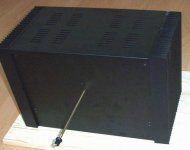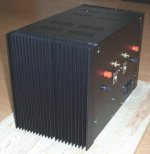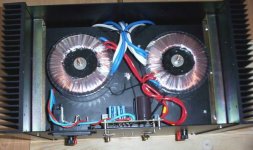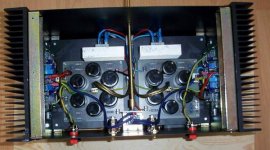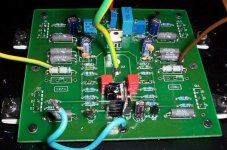Hello all!
I decided to show you pictures of my small Aleph-X. Small, because its voltage rails are about 15V and 1.6A bias per side. It gives me 12W rms or so at 4 ohm load. It is enough for me im my 20 m square room.
There is no front panel yet, maybe it would be made from wood. Currently my AlephX is unbalanced however I am going to make a BLS preamp.
The front view:
I decided to show you pictures of my small Aleph-X. Small, because its voltage rails are about 15V and 1.6A bias per side. It gives me 12W rms or so at 4 ohm load. It is enough for me im my 20 m square room.
There is no front panel yet, maybe it would be made from wood. Currently my AlephX is unbalanced however I am going to make a BLS preamp.
The front view:
Attachments
Nice work!!...but I would of cut down that volume control shaft maybe a quarter inch shorter...hahaha
Cheers!!The DIRT®
Cheers!!The DIRT®

jarek said:Its my 'remote control'🙂
That's a good one, I'll remember that!
Nice amp, I hope you'll enjoy every second of it!
Audiofanatic 😉
More technical info:
Two 300W tranformers, two diode bridges , two power supplies with CRCRC filters (20mF R 10mF R 10mF) on each rail. R consist of two parallel 0,22 ohm resistors.
Differencial dc on the output are about 20 mV at start and stay very stable. Absolute DC start with 4V and decrease to about 30-40 mV after 1 hour play.
My AX is unbalanced and has two 4.7 uF input capacitors on each channel. One side of each channel is grounded before the input capacitor.
I have slight hum (my loudspeakers are 4 ohm, 90dB) and think, that I should increase the capacitance of filtering capacitors and resitance of R.
Power transitors are IRFP044 and are biased at 1.6A (0.33 ohm bias resistors).
PCB is a slighty modified HIFIzen design (added input capacitors) – very thanks hifiZEN for inspiration!
I am very happy with work on this amp, thank you All from diyaudio. Mostly thanks to Nelson Pass.
What next?
Two 300W tranformers, two diode bridges , two power supplies with CRCRC filters (20mF R 10mF R 10mF) on each rail. R consist of two parallel 0,22 ohm resistors.
Differencial dc on the output are about 20 mV at start and stay very stable. Absolute DC start with 4V and decrease to about 30-40 mV after 1 hour play.
My AX is unbalanced and has two 4.7 uF input capacitors on each channel. One side of each channel is grounded before the input capacitor.
I have slight hum (my loudspeakers are 4 ohm, 90dB) and think, that I should increase the capacitance of filtering capacitors and resitance of R.
Power transitors are IRFP044 and are biased at 1.6A (0.33 ohm bias resistors).
PCB is a slighty modified HIFIzen design (added input capacitors) – very thanks hifiZEN for inspiration!
I am very happy with work on this amp, thank you All from diyaudio. Mostly thanks to Nelson Pass.
What next?
Hum
Needless to say this would need some turn on surge protection
but with 15v rails couldn,t some of the BETTER 1F boomer caps
be used? Don't some of the better ones have working Voltage
ratings of say 18v and searge ratings of 22v or so ?
Needless to say this would need some turn on surge protection
but with 15v rails couldn,t some of the BETTER 1F boomer caps
be used? Don't some of the better ones have working Voltage
ratings of say 18v and searge ratings of 22v or so ?
If your heatsinks allow it I'd suggest a current increase, since you have a 4 ohm load.
With your 15V rail you could get to nearly 70W to the speaker, of course with the needed current....
Do a search for "berekening", you'll find a useful spreadsheet to calculate the amount of power for different loads given voltage rails and current bias, so you can "tune" your amp for best performance with your speakers.
Cheers
Andrea
With your 15V rail you could get to nearly 70W to the speaker, of course with the needed current....
Do a search for "berekening", you'll find a useful spreadsheet to calculate the amount of power for different loads given voltage rails and current bias, so you can "tune" your amp for best performance with your speakers.
Cheers
Andrea
Andrea,
I don’t think so. I can get only 18V peak at the output without load. Than U rms is 12.7 V.
True rms power could be only 20W or so with 4 ohm load. This power needs current 18/4=4.5 A peak. With 50% current gain, the bias current should be 2.25 A minimum (for one side)
Correct me if I am wrong.
I don’t think so. I can get only 18V peak at the output without load. Than U rms is 12.7 V.
True rms power could be only 20W or so with 4 ohm load. This power needs current 18/4=4.5 A peak. With 50% current gain, the bias current should be 2.25 A minimum (for one side)
Correct me if I am wrong.
jarek said:Andrea,
I don’t think so. I can get only 18V peak at the output without load. Than U rms is 12.7 V.
True rms power could be only 20W or so with 4 ohm load. This power needs current 18/4=4.5 A peak. With 50% current gain, the bias current should be 2.25 A minimum (for one side)
Correct me if I am wrong.
I used this spreadsheet found on the AlephX - High power version thread: http://www.diyaudio.com/forums/attachment.php?s=&postid=101066
Witn 15V rails and 6 Amps total bias (3 per side) it gives about 72W/ 4 Ohm.
Even with your voltage swing (btw it seems a bit low, but maybe the spreadsheet is too optimistic with only 2V per rail of voltage headroom) you get 18Vpk = 12.7 Vrms * 12.7Vrms / 4 = 40W, not 20.
The power must be halved only if you use the peak value.
The current seems ok to me.
Cheers
Andrea
PS Soon I'll finish mine, so I'll have the chance to measure the real thing.
elsewhere in these threads, Nelson has said that he prefers rails up in the 20 volt range for the Aleph X.
can anybody tell the difference between Aleph X's with higher rail voltages versus lower rail voltages???
Can you run Aleph X's at higher rail voltages, but just not bias them as high if all you need is 40 watts?
can anybody tell the difference between Aleph X's with higher rail voltages versus lower rail voltages???
Can you run Aleph X's at higher rail voltages, but just not bias them as high if all you need is 40 watts?
- Status
- Not open for further replies.
- Home
- Amplifiers
- Pass Labs
- My small Aleph-X
